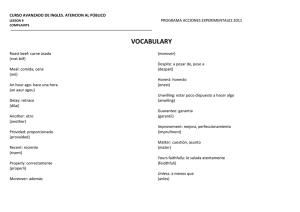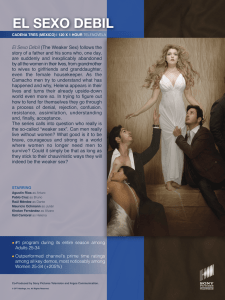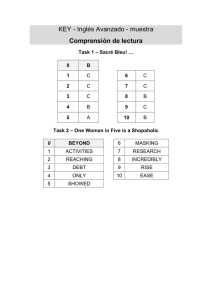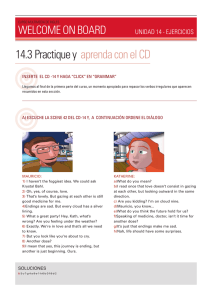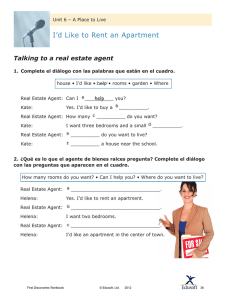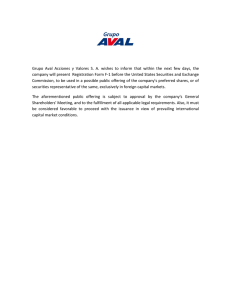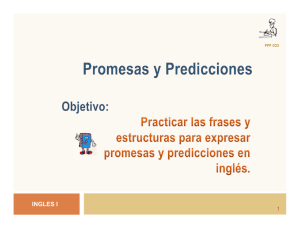Documento Base - Portal de Empleo Sierra de las Nieves
Anuncio
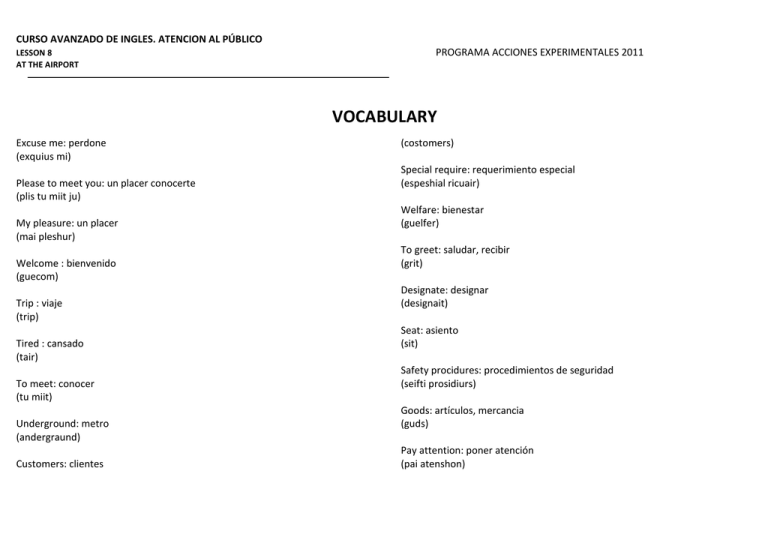
CURSO AVANZADO DE INGLES. ATENCION AL PÚBLICO LESSON 8 AT THE AIRPORT PROGRAMA ACCIONES EXPERIMENTALES 2011 VOCABULARY Excuse me: perdone (exquius mi) Please to meet you: un placer conocerte (plis tu miit ju) My pleasure: un placer (mai pleshur) Welcome : bienvenido (guecom) Trip : viaje (trip) Tired : cansado (tair) To meet: conocer (tu miit) Underground: metro (andergraund) Customers: clientes (costomers) Special require: requerimiento especial (espeshial ricuair) Welfare: bienestar (guelfer) To greet: saludar, recibir (grit) Designate: designar (designait) Seat: asiento (sit) Safety procidures: procedimientos de seguridad (seifti prosidiurs) Goods: artículos, mercancia (guds) Pay attention: poner atención (pai atenshon) CURSO AVANZADO DE INGLES. ATENCION AL PÚBLICO PROGRAMA ACCIONES EXPERIMENTALES 2011 LESSON 8 AT THE AIRPORT LISTENING Presentarse a uno mismo (audio airport 1) You: Excuse me… Are you Mr. Hasek? Mr. Hasek: Yes, I am. You: Good morning Mr. Hasek. I am Marta Lopez. I am Mr. Santos secretary. Pleased to meet you. Mr. Hasek: My pleasure. You: Welcome to Spain. How was your trip? Mr. Hasek: It was great but I’m tired. You: I see… Let’s take a taxi. QUESTIONS 1. Who is Marta Lopez ? 2. Where did Mr. Hazek arrive? 3. How did he arrive? Presentar formalmente ( audio airport 2) You: Mrs. Santos, I’d like you meet Mr. Hasek from the Czech Republic. Mrs. Santos: How do you do? Mr. Hasek: How do you do? Mrs. Santos: Welcome to Spain. Mr. Hasek. QUESTIONS 1. Where is Mr. Hazek from? 2. Who is meeting Mr. Hazek? Presentar con un grado de formalidad inferior (audio airport 3) You: Hi Peter! How are you? Xes: Fine, thanks. And you? You: Very well, thank you. See, this is Helena. She is a receptionist in London. Xes: Hi Helena. Nice to meet you. Helena: Nice to meet you. QUESTIONS 1. What does Helena do? 2. Where does she work? CURSO AVANZADO DE INGLES. ATENCION AL PÚBLICO PROGRAMA ACCIONES EXPERIMENTALES 2011 LESSON 8 AT THE AIRPORT Hablar de uno mismo. (audio airport 4) Xes: I know London very well. Where do you live? Helena: I live in Oxford St. Xes: You live in the city centre. Do you take the underground to work? Helena: Yes, I do. Xes: Are you happy in this company? Helena: Yes, I am. I like my job. Xes: What are you responsible for? Helena: I welcome customers, organize phone calls, fax and email, and help customers with any special require, Xes: You are very busy!! Helena: Yes, I am. Oh! It’s about time to go to the conference. Xes: OK. Let’s go. QUESTIONS 1. 2. 3. 4. 5. 6. Where does Helena live? Where is Oxford Street? Does Helena like her job? Does she take the underground? What does she do at her job? What are they going to do? TRADUCTION You: Discúlpeme… ¿Es usted el Sr. Hasek? Mr. Hasek: Si, lo soy. You: Buenos días Mr. Hasek. Soy Marta López. Soy la secretaria del Sr. Santos. Encantada de conocerle. Mr. Hasek: Un placer. You: Bienvenido a España. ¿Cómo fue su viaje? Mr. Hasek: Fue bien pero estoy cansado. You: Eso veo… Vamos a coger un taxi. You: Sra. Santos, querría presentarle al Sr. Hasek de la República Checa. Mrs. Santos: ¿Cómo esta? Mr. Hasek: ¿Cómo esta? CURSO AVANZADO DE INGLES. ATENCION AL PÚBLICO PROGRAMA ACCIONES EXPERIMENTALES 2011 LESSON 8 AT THE AIRPORT Mrs. Santos: Bienvenido a España, Mr. Hasek. You: Hola Xes! ¿Cómo estas? Xes: Bien, gracias. ¿Y tú? You: Muy bien, garcías. Mira, ella es Helena. Es recepcionista en Londres. Xes: Hola Helena. Encantado de conocerle. Helena: Encantada de conocerle. Xes: Conozco Londres muy bien. ¿Dónde vives? Helena: Vivo en la calle Oxford. Xes: Vives en el centro de la ciudad. ¿Cojes el metro para el trabajo? Helena: Si, lo cojo. Xes: ¿Estás feliz en esa compañía? Helena: Si lo estoy. Me gusta mi trabajo. Xes: ¿Qué responsabilidades tienes? Helena: Les doy la bienvenida a los clientes, organizo llamadas de teléfono, fax e e-mails, y ayudo a los clientes con cualquier cosa que necesite. Xes:! Estas muy ocupada! Helena: Si, lo estoy. Oh! Es hora de ir a la conferencia. Xes: Bien. Vamos. EXCERSICES 1. Completa el diálogo: You: Excuse me. ____________________ Mrs. Lopez? Mrs. Yes, I am. You: Good morning Mrs. Lopez. ____________________ Marta. ___________________ to meet youMrs. Lopez: ___________________ to meet you. You: Welcome to Spain. __________________ you tired? Mrs. Lopez: Yes, I am. You: Let’s take a taxi. CURSO AVANZADO DE INGLES. ATENCION AL PÚBLICO LESSON 8 AT THE AIRPORT PROGRAMA ACCIONES EXPERIMENTALES 2011 2. Traduce los textos. WHAT ARE YOU RESPONSIBLE FOR (audio airport 5) Maria: I’m an air-hostess. I am responsible for the safety, welfare, comfort and care of passengers on an aircraft. I meet and greet passengers when they board and help them to their designated seats. Then, I demonstrate safety procedures and check all passengers seat belts. When the plane takes-off, I sell duty free goods and I pay attention to identify passengers needs. Mark: I’m a hotel manager. I’m responsible for the hotel management. I have responsibly for planning, organizing and directing the work. Besides, I recruit and train staff. My main goal is to ensure customers satisfaction. Antonio: I’m a public relation officer. I’m responsible for the reputation of organisations. I research into public opinion, plan PR (Public Relations) campaigns, answer enquires from journalist and organize especial events such as conference and exhibitions. Sandra: I’m a travel agent. I’m responsible for sale and holyday and business travel products. I handle customer order and I advise clients about foreign currency, travel insurance and visas. I deal with complains. CURSO AVANZADO DE INGLES. ATENCION AL PÚBLICO PROGRAMA ACCIONES EXPERIMENTALES 2011 LESSON 8 AT THE AIRPORT GRAMMAR. IRREGULARS VERBS Infinitivo Pasado Participio de pasado Español Beat Become Burn Catch Choose Cut Draw Feel Find Hear Keep Let Light Mean Mow Beat/Beaten Become Burnt Caught Chosen Cut Drawn Felt Found Heard Kept Let Lit Meant Mown Ganar/Golpear Llegar a ser Quemar Coger Escoger Cortar Dibujar Sentir/tocar Encontrar Oir Retener Dejar/arrendar Encender Querer decir Cortar(cesped) Beat Became Burned/Burnt Caught Chose Cut Drew Felt Found Heard Kept Let Lit Meant Mowed Infinitivo Pasado Participio de pasado Español Overcome Prove Put Replay Shake Smell Spin Stand Swear Teach Throw Tread Undo Wear Write Overcame Proved Put Repaid Shook Smelled Span Stood Swore Taught Threw Trod Undid Wore Wrote Overcome Proven Put Repaid Shaken Smelt Spun Stood Sworn Taught Thrown Trodden Undone Worn Written Vencer Probar Poner Reembolsar Agitar(se) Oler Estar de pie Jurar Enseñar Lanzar Pisar Deshaser Llevar puesto Escribir CURSO AVANZADO DE INGLES. ATENCION AL PÚBLICO PROGRAMA ACCIONES EXPERIMENTALES 2011 LESSON 8 AT THE AIRPORT Model verbs: + I can play the guitar. › Yo puedo tocar la guitarra. Can: - I can’t play the guitar › Yo no puedo tocar la guitarra. ¿ Can you play the guitar › ¿Tu puedes tocar la guitarra? 1. Posibilidades: Expresan una posibilidad: Poder: Can: Es el infinitive y solo se usa en el presente Could: Es el pasado y el condicional Be able to...: Se utiliza con todos los demás tiempos conjugando el “Be”. + We could come. Could: - He couldn’t come. ¿ Could he come? + I will be able to do it › Yo podre hacerlo. Be able to: - I won’t be able to do do it › Yo no podre hacerlo. ¿ Will you be able to do it? › ¿Podrás hacerlo? 2. Obligaciones: Must Obligation Have to Advice Lack of obligation Should Ought to Don’t/doesn’t/didn’t have to Needn’t › Nosotros pudimos/podríamos venir. › Él no pudo/podría venir. › ¿Él pudo/podría venire? Obligación Deducción Sin vebos auxiliares CURSO AVANZADO DE INGLES. ATENCION AL PÚBLICO PROGRAMA ACCIONES EXPERIMENTALES 2011 LESSON 8 AT THE AIRPORT EXCERSICES 3. Completa las oraciones con el tiempo adecuado del verbo entre paréntesis: a. b. c. d. e. f. g. h. i. j. How long ____________________ (you/be) here? He _________________ (study) English for three years. They ____________________ (listen) to music now. When ____________________ (she/arrive) yesterday? What colours ____________________ (be) this jumper? Why ____________________ (you/break) the glass this morning? When he ____________________ (arrive) he ________________________ (listen to music) They ____________________ (play handball for ten years. If you don’t do out, you __________________ (not/make) new frinds. I ____________________ (win) a race when I was ten years old. 4. Completa con el verbo modal que corresponda: a. b. c. d. e. ____________________ you ride a bike when you were a child? ____________________ come tomorrow? You ____________________ study more. You ____________________ smoke in pubs. Students ___________________ study in summer. 5. Traduce: a. b. c. d. Ha podido arreglar el ordenador. No tiene por que traer el coche. Could you finish the composition? He must be very tired today.
